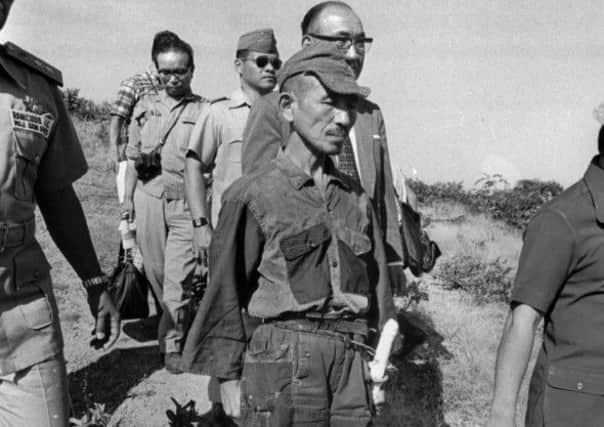Japan WW2 soldier who surrendered in 1974 dies


Hiroo Onoda, an army intelligence officer, remained in hiding in the jungle on Lubang Island, near Luzon, until 1974 because he did not believe the war was over.
His family said the former soldier, who was originally from Wakayama prefecture in western Japan, died of heart failure on Thursday in Toyko.
Advertisement
Hide AdAdvertisement
Hide AdMr Onoda, the last Japanese imperial soldier to emerge from hiding, only agreed to surrender after his ageing former commanding officer was flown in to talk to him at his hide-out in the north-western Philippines and rescinded his military orders.
His actions caused a worldwide sensation, and on his return to Japan he was treated as a national hero.
Mr Onoda later explained that up until that point he believed attempts to persuade him to leave the jungle were a plot concocted by the pro-US government in Tokyo.
By the time he surrendered he had been on the island since 1944, two years after he was drafted into the Japanese imperial army.
When the war was drawing to a close, Mr Onoda, then a lieutenant, found himself cut off on Lubang as US troops headed north.
Like others in the Japanese army, the young soldier had orders never to surrender to the enemy – a command he obeyed for 29 years.
Speaking in an interview in 2010, Mr Onoda said: “Every Japanese soldier was prepared for death, but as an intelligence officer I was ordered to conduct guerrilla warfare and not to die.
“I became an officer and I received an order. If I could not carry it out, I would feel shame.”
Advertisement
Hide AdAdvertisement
Hide AdWhile on Lubang Island, Mr Onoda surveyed military facilities and engaged in sporadic clashes with local residents.
Three other soldiers were with him at the end of the war. The world first became aware of Mr Onoda’s existence when one of his fellow soldiers emerged from the jungle in 1950 and returned to Japan. The other two died, one in a shoot-out with Philippine troops in 1972 which had involved Mr Onoda.
The incident created a sensation in Japan, but Mr Onoda ignored several attempts to get him to surrender. The regular overhead flights by US planes during the Vietnam war also convinced him the battle was still being played out across Asia.
When he did finally emerge from the jungle, Mr Onoda surrendered to the then Philippine president Ferdinand Marcos in March 1974.
He then saluted the Japanese flag and handed over his Samurai sword while still wearing his tattered imperial army uniform.
He wept as he agreed to lay down his rifle, which was still in perfect working order.
Profile: Onoda only surrendered on CO’s orders
HIROO Onoda became one of the most famous Japanese soldier “holdouts” in the Second World War – a select band of a few dozen fighters who refused to surrender to the Allied forces.
Born on 19 March, 1922, in a village in Wakayama Prefecture, Mr Odona enlisted in the Imperial Japanese Army, aged 20. After training as an intelligence officer, he was sent to the Philippines in December, 1944.
Advertisement
Hide AdAdvertisement
Hide AdMr Onoda, below, joined forces with a small group of Japanese soldiers, but by the time US and Philippine Commonwealth forces took the island in February, 1945, their ranks had been reduced to four.
They took to the hills and carried out a guerrilla war involving killing around 30 Filipino inhabitants as well as engaging in several shoot-outs with police.
He ignored leaflets stating the war was over as enemy Allied propaganda. He was declared officially dead in December 1959. By 1972, following a police shoot-out, only Mr Onoda remained in hiding. He agreed to come out of the jungle after 29 years when his former CO ordered him to surrender in March 1974.